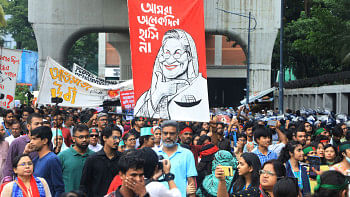Punishing children at home
It is jarring to note that up to two-thirds of the country's children are subjected to some kind of beating by their parents. In a front page report on Monday, Prothom Alo highlighted this less known and perhaps least discussed parental high-handedness on their children. Being based on UNICEF-assisted Multiple Indicator Cluster Survey (MICS) carried out by the Bangladesh Bureau of Statistics, the revelations are as authentic as they are instructive in terms of behavioural norms.
'Child disciplining' involves making the children attentive to studies, their taking meals on time and complying with other parental instructions supposedly for the good of the wards. Rather than being persuasive with words, many parents still tend to employ the hackneyed adage,'Spare the rod, spoil the child'. Out of every three mothers, one believes that in order to teach rules to a child, it is necessary to apply physical punishment. Equally, if not more, worrying is the finding that 74.4 percent of the children are imparted discipline by exerting mental pressure on them.
Around 73.6 percent of three to four-year-old toddlers fall victim to physical punishment at home. Rural children are more vulnerable than their urban counterparts. Physical punishment of the kids can morph into violent adolescent behaviour; the victims may even take to criminal behaviour in the future.
Further research is needed to authenticate the findings on a national scale. However, a serious issue has been flagged off and as a signatory to the international child rights conventions we have to discourage all kinds of child unfriendly attitudes and practices. How are we going to stamp out corporal punishment from educational institutes if at home it is in vogue in one form or the other?

 For all latest news, follow The Daily Star's Google News channel.
For all latest news, follow The Daily Star's Google News channel. 



Comments